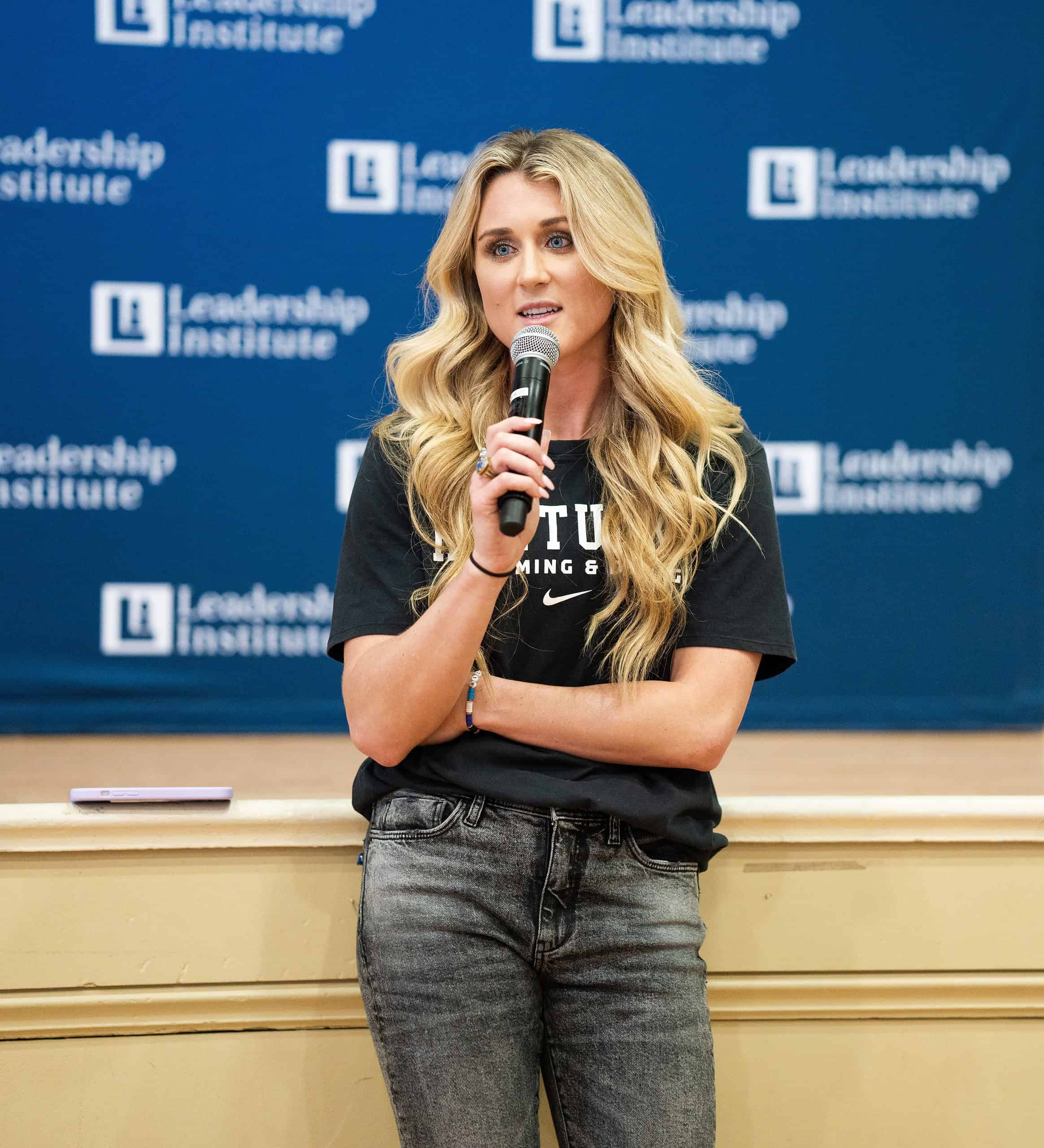Riley Gaines Claps Back at Simone Biles in Heated Exchange Over Women’s Sports: “You’d Have Zero Golds If Your ‘Inclusive’ Dream Came True”
In a fiery war of words that’s igniting controversy across social media and sports circles alike, former NCAA swimmer and outspoken women’s rights advocate Riley Gaines delivered a stinging rebuke to Olympic gymnastics legend Simone Biles. The confrontation stems from Biles’ recent remarks criticizing Gaines for her continued stance on preserving women’s sports exclusively for biological females — a stance Gaines has held ever since her experiences competing against transgender swimmer Lia Thomas.
The drama began when Simone Biles, four-time Olympic gold medalist and one of the most decorated gymnasts in history, took aim at Gaines in a recent interview. Biles labeled Gaines’ advocacy “exclusionary,” suggesting that true progress in sports means being “inclusive of all identities.” She went on to suggest that Gaines’ activism is “rooted in fear” rather than fairness.

That didn’t sit well with Gaines, who quickly fired back in a social media post that has since gone viral.
“You know how many gold medals you’d have if your ‘inclusive’ dream came true?” Gaines wrote. “Zero. Not one. You would’ve been watching from the stands as a biological male outperformed you in every event.”
Gaines, who became a prominent voice in the ongoing debate surrounding transgender athletes in women’s sports, hasn’t minced words in the past — and she didn’t hold back here either. In her follow-up remarks, she continued:
“Simone, you quit on your teammates in the middle of the Olympics. You want to lecture me about standing up for women? I stayed, I fought, and I continue to speak for every young girl who’s been pushed to the sidelines in her own sport.”
The reference to Biles’ 2021 Olympic withdrawal — when Biles stepped away from several events citing mental health challenges — drew criticism and praise alike. At the time, Biles’ decision was hailed by many as a powerful statement about prioritizing mental well-being. But others saw it as a betrayal of competitive spirit. Gaines, it seems, falls squarely into the latter camp.
Biles has yet to publicly respond to Gaines’ latest remarks. However, her original comments were part of a broader discussion on “equality in sports,” where she noted, “The future of athletics depends on creating spaces where everyone feels welcome, seen, and celebrated.”
But Gaines argues that such inclusion comes at a price — fairness.
“Inclusion shouldn’t mean exclusion for women who’ve trained their entire lives,” Gaines said in an interview later that day. “This isn’t about hate or discrimination. It’s about biology, and about keeping the playing field level.”

The internet has since exploded with reactions, with hashtags like #StandWithRiley and #TeamSimone trending across X (formerly Twitter), Instagram, and TikTok. Athletes, pundits, and everyday fans have taken sides, with some praising Gaines for her bravery and others blasting her for what they call “bigoted rhetoric.”
One former Olympian, who asked not to be named, weighed in on the controversy: “It’s tough. I support trans rights fully, but when it comes to competition, especially at the highest levels, the science matters. Riley isn’t wrong for wanting fairness.”
Meanwhile, advocacy groups supporting transgender inclusion have condemned Gaines’ comments as “harmful” and “dangerous,” accusing her of using fear tactics to rally opposition.
But Gaines remains undeterred. “I’m not backing down,” she said. “Not until women are protected in their own sports, in their own locker rooms, and in their own categories.”
The debate over transgender inclusion in sports continues to rage, with no easy answers in sight. Legislative battles have emerged across the United States, with several states enacting laws that bar transgender girls and women from competing in female sports categories. The Biden administration has proposed Title IX changes that could impact these policies, further fueling the national debate.
In this cultural and political maelstrom, figures like Riley Gaines and Simone Biles have become more than athletes — they’re symbols of competing visions for the future of sports.
One side sees a future of diversity and inclusivity, where barriers based on gender identity fall away. The other side envisions a defense of what they see as fundamental fairness, rooted in biological distinctions.
As for Gaines, she’s made her position crystal clear: “I’m not trying to erase anyone’s identity. I’m trying to protect women’s reality.”






